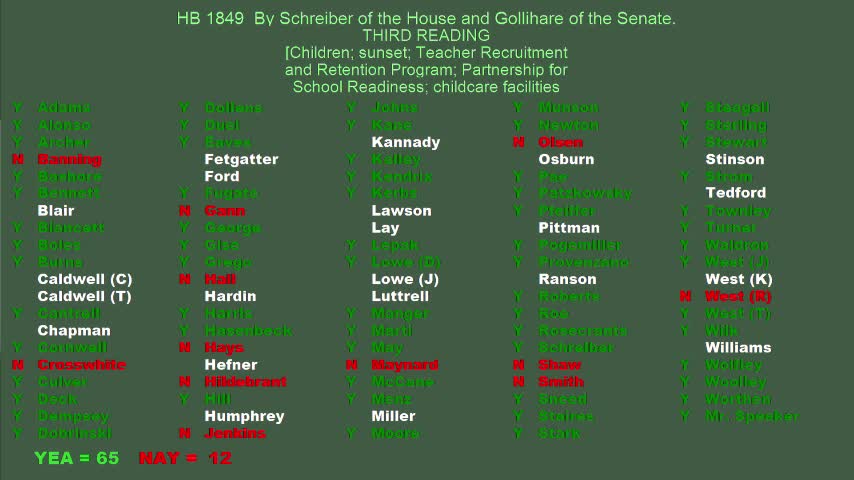House approves setback rules for wind projects, grants counties voting and petition options
Get AI-powered insights, summaries, and transcripts
Subscribe
Summary
The Oklahoma House on Friday passed House Bill 27 51, a compromise measure that sets statewide minimum setbacks for new industrial wind turbines in counties that meet specified population‑density and wind‑speed thresholds and gives county residents and county commissioners routes to opt in, opt out or place modifications on the ballot.
The Oklahoma House on Friday passed House Bill 27 51, a compromise measure that sets statewide minimum setbacks for new industrial wind turbines in counties that meet specified population-density and wind-speed thresholds and gives county residents and county commissioners routes to opt in, opt out or place modifications on the ballot.
Representative Trey Caldwell, the bill’s author, told the House the measure “provides a foundational regulatory authority when it comes to setbacks and these two compelling and competing property rights,” and described the bill as the product of extended negotiations. He explained the bill’s core protections and technical triggers for when its requirements apply.
The measure establishes, in the parts of the state that meet the statute’s thresholds, a half-mile setback from a nonparticipating dwelling and a 1.5-times tip‑height setback from any nonparticipating property line. Counties that do not automatically fall under the thresholds may adopt the law by a county‑commission vote or by citizen initiative: a petition requires signatures equal to 10% of votes cast in the county in the last presidential election. The bill uses an interconnection date in the Southwest Power Pool and adds a construction‑continuation rule; projects with long‑parked interconnection dates must begin continuous construction in a specified timeframe or become subject to the new setbacks, Caldwell said. He summarized the intent: “All this bill does is like putting good fences up between you and your neighbor. It makes a good neighbor.”
Opponents raised economic and safety concerns. Representative Deck argued the bill “misses a true opportunity to commoditize for property owners potential windfalls” and said the measure sends a message that discourages future investment and jobs. Representative Rose Waldron warned the bill “kicks the problem back to the counties,” noting initiative petitions may be advanced by a relatively small share of voters and that county‑level fights will follow. Representative Munson said the bill risks sending a signal that Oklahoma will change rules on industry investments when political pressure rises.
Supporters, including Representative Chapman and Representative Hayes, said the bill balances property‑owner interests and public‑safety concerns and creates a predictable baseline for industry and counties. Representative Shaw, who offered an amendment that failed on the floor, framed the debate in terms of local control and safety: her amendment would have applied a different set of setback rules and a county ballot option; the House rejected that amendment 18‑72.
The bill is prospective and does not require removal of existing wind turbines, lawmakers said. Representative Caldwell said existing, already constructed turbines are unaffected and that previously executed contracts remain valid; new projects and projects without an executed interconnection or that do not meet construction timeframes would be subject to the act’s requirements. Caldwell also said the legislation incorporates language mirroring oil‑and‑gas construction‑continuation standards to limit indefinite project parking in interconnection queues.
Key issues highlighted during debate included local economic impacts and tax revenue in some rural counties, local air‑ambulance flight‑path concerns, decommissioning costs if projects later fail, and differing turbine heights and wind characteristics between eastern and western Oklahoma. Supporters argued the bill preserves the ability for counties and landowners to reach private agreements and for counties to adopt different rules by ballot; critics said the thresholds and petition process could be used to block projects even where a majority of landowners or local elected officials support them.
Votes at a glance
- House Bill 27 51 (wind energy): Final passage recorded 68 yes, 22 no; emergency clause also recorded as passed. (Bill moves to the Senate as amended.)
- House Bill 29 03 (higher education repealer/committee formation): Passed the House (recorded vote reported in the transcript). Emergency clause recorded as passed.
- House Bill 18 49 (early childhood workforce recruitment/retention incentives): Passed the House (recorded vote reported in the transcript).
- House Bill 21 60 (motor vehicles, request of the Oklahoma New Motor Vehicle Commission): The transcript records floor consideration; the measure did not advance to final passage in the House (final disposition: failed; transcript did not provide a single, unambiguous recorded tally for final disposition).
What’s next
The bill, as passed and carrying an emergency clause, goes to the Senate for consideration; if enacted, it would take effect according to the emergency language. Lawmakers and supporters urged counties, stakeholders and affected landowners to follow the Senate process and, if they wish, prepare ballot language or county‑commission action if they want to exercise local options. Lawmakers who opposed the bill signaled possible legal and political challenges and said they expect county‑level contests and continued legislative follow‑up.
